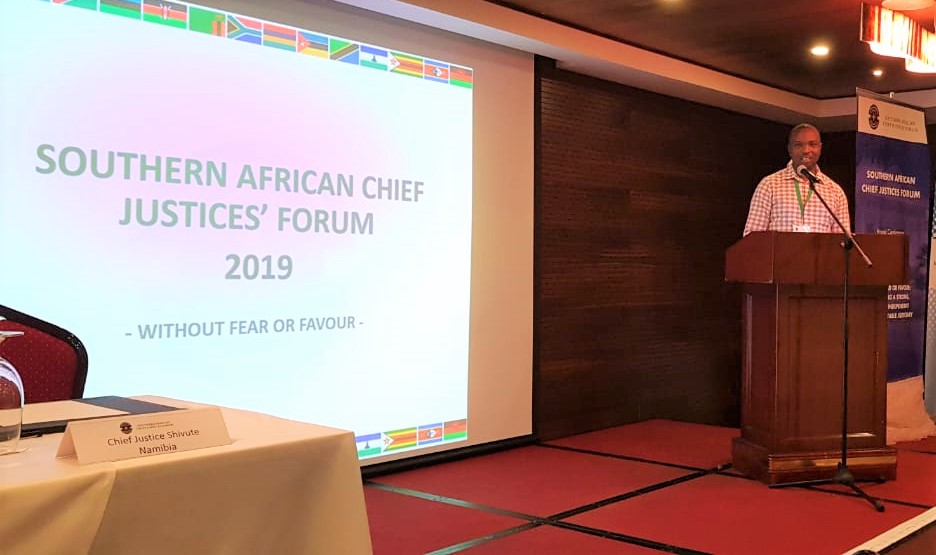20 October 2019 Nairobi
Open letter to H.E President Uhuru Kenyatta
President of the Republic of Kenya
Copies To:
Hon (AMB) Ukur K. Yatani- Ag. Cabinet Secretary, National Treasury and Planning
Hon. Stephen Masha- Ag. Cabinet Secretary, Controller of Budget
Hon. Justice David Maraga- Chief Justice of the Republic of Kenya
Dear Your Excellency, Uhuru Kenyatta, President of the Republic of Kenya and Commander in Chief of the Defense Forces,
RE: A CALL TO RESPECT AND SUPPORT JUDICIAL INDEPENDENCE
Please receive sincere greetings from the ICJ Kenya, a premier human rights organisation that has been promoting and protecting the rule of law, democracy and human rights in Kenya for the past 60 years.
ICJ Kenya wishes to register its concerns over what we perceive as systemic interference of the independence of the Judiciary by your administration.
We wish to draw your attention to the National Treasury Circular No. 14A dated 24th September 2019 referenced ES 1/03/ ‘TY’ (63) issued by Hon (AMB) Ukur K. Yatani- Ag. Cabinet Secretary, National Treasury and Planning. This circular is addressed to all cabinet secretaries and accounting officers to the effect that the budgets for government ministries, departments and agencies have received drastic cuts.
Your Excellency,
The Judiciary is an independent arm of government and is neither a government ministry, department or agency and ought not to have been affected by this circular. Indeed, Article 173 of the Constitution of Kenya has provided for the establishment of an independent Judiciary Fund meant to provide the Judiciary with financial security. We note however that the circular has, in effect, occasioned budget cuts on the Judiciary.
Your Excellency,
ICJ Kenya is concerned that these budget cuts will severely and negatively impact on the achievement of the Judiciary and its ability to fulfil its basic constitutional mandate. ICJ Kenya notes that the Judiciary presented a budgetary request of KES 31.2 billion for the current financial year. This budgetary request was first drastically reduced to KES 17.4 billion, and now has suffered a further reduction to KES 14.5 billion, an over 50% deficit cut. In the last financial year, the Judiciary received only 40% of its budgetary requirement with a resultant effect that it is unable to sufficiently fulfil its core constitutional mandate of delivering justice to Kenyans. This trend is consistent with previous budgetary cuts in the last five years.
The 50% reduction in development funding to the Judiciary equates to suspension of over 100 court construction and rehabilitation works that are at various stages of progress which are meant to improve physical access to courts and reduce the distance travelled in search of justice. Further, over 10% in reduction of recurrent funding will affect the quality of service delivery, including operation of mobile courts and sub-registries, equipping and refurbishing courtrooms, training of judicial officers and staff, and digitisation of court processes.
Regretfully, the circular named above has resulted in many negative trends that are derailing the cause of justice. The Cooperative Tribunal has suspended sittings. Other tribunals have suspended sittings out of Nairobi. The movement of judicial officers to hearing sites is curtailed due to lack of fuel. The critical training for judicial officers has been suspended. Mobile courts and service weeks have been suspended, and courts may not have stationary to operate with. These are serious impediments to the achievement of access to justice, and in the end, it is the people of Kenya who are being punished by financially crippling the Judiciary.
Your Excellency,
Financial autonomy is an essential element of judicial independence, which in turn is a pre-requisite to the rule of law and a fundamental guarantee of a fair trial. Courts should not be subject to improper influence, which includes financial interference. The UN Basic Principles on the Independence of the Judiciary provide that the State must provide adequate resources to enable the Judiciary as an institution to perform its functions properly. Indeed, even while the Judiciary Fund has not yet been actualised, the fact that it has been established by the Constitution requires that the Treasury allocates sufficient funds to the Judiciary, which according to international best practices should be at least 3.5% of the national budget.
The said circular justifies the budget cuts to the Judiciary to ensure provisions for the implementation of the ‘Big Four’ plan of enhancing manufacturing, food security and nutrition, universal health coverage and affordable housing. The Big Four plan, while important, must also consider access to justice needs of Kenyans across the country. The success of the Big Four will require a functioning Judiciary for the arbitration and settlement of disputes in a timely and consistent manner. For a vibrant economy to exist, we must have a vibrant Judiciary. Businesses and investors would be wary to operate in an environment where disputes cannot be adjudicated quickly and efficiently. The needs and priorities of the Judiciary should not be undermined by the priorities of the other arms of government. Otherwise this can easily be interpreted as undue influence and interference with the independence of the Judiciary.
Your Excellency,
ICJ Kenya would also like to draw your attention to several other trends that are unsettling.
On July 22 and August 13, the Judiciary through the Judicial Service Commission forwarded to you a total of 41 names for appointment of judges of the Court of Appeal, judges of the Environment and Land Court and judges of the Employment and Labour Relations Court. To date, these judges have not been appointed to office. There has also been a delay in the transfer of the tribunals previously under government ministries into the ambit of the Judiciary. The failure to transfer these tribunals is inconsistent with Article 159 and 169 of the Constitution which affirms that tribunals are part of the judicial system. Transfering tribunals to the Judiciary will ensure that the quality of justice dispensed with is consistent.
Your Excellency,
From the aforementioned, ICJ Kenya respectfully recommends to you as follows:
- That you direct the Executive and public officials to cease and desist from interfering with the independence of the Judiciary and undermining its authority. They should support the independence of the Judiciary as their duty and allegiance to the Constitution and the rule of law.
- That you direct the National Treasury to withdraw the 14% budget cuts amounting to KES 2.8 billion affecting the Judiciary as a result of National Treasury Circular No. 14A. The Judiciary is an independent arm of government and ought not to have been affected by a circular to government ministries, departments and agencies.
- That you direct your government to hasten the actualisation of the Judiciary Fund as required by the Constitution to ensure financial independence and security for the Judiciary. The Big Four agenda will only be achieved with the support of a financially stable Judiciary.
- That the 41 names forwarded to you by the JSC for the appointment of judges to the Court of Appeal, ELC and ELRC be gazetted.
- That you mobilise the Jubilee members of Parliament and their partners in the Legislature to expedite the establishment of the Judiciary Fund.
- That you direct that all necessary measures be taken to ensure that all tribunals are transferred under the Judiciary, along with corresponding funding and necessary resource allocation.
ICJ Kenya will remain ceased of this matter and looks forward to working with your government to secure an independent and well-resourced Judiciary. ICJ Kenya can greatly assist you in achieving your Big Four Agenda and looks forward to working closely with your government on the matters outlined above to ensure access to justice for all Kenyans.
Yours sincerely,
The Chairman,
ICJ Kenya











